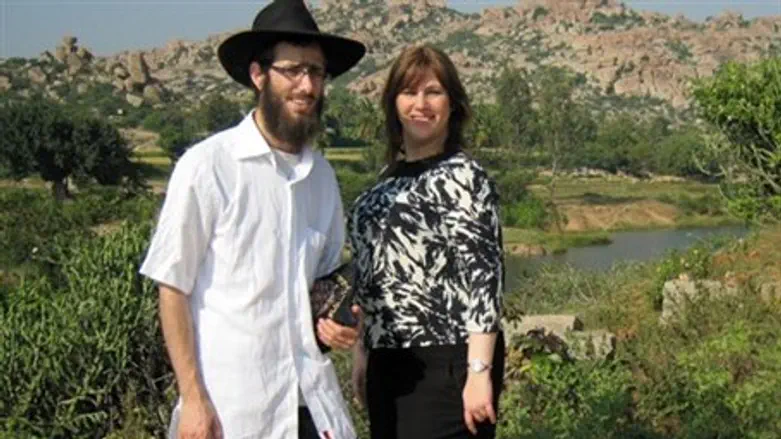
Motti and Libi Gromach are Chabad emissaries to a picturesque rocky, temple-filled village in India called Hampi. The couple buried their daughter, Devorah Leah Geulah, two years ago at the age of eleven after she was misdiagnosed by local doctors who overlooked a lung infection that killed her.
Two years after the event the Gromachs have inaugurated a mikveh (ritual bath) in her honor. In an interview with Arutz Sheva Motti spoke about the difficulties that the couple overcame to establish the mikveh.
“Building anything in India is not simple. The situation here is very primitive. I just travelled 14 hours to Mumbai in order to purchase lighting for the mikveh so that everything can be as high quality as possible.”
There is a large need for the mikveh in Hampi, as the place is frequented by Israeli tourists and backpackers due to “the incredible view and nature in the area,” said Motti.
Libi Gromach herself used to make a round trip of over 34 hours to use a kosher mikveh. In an interview which she gave in 2012 regarding living as an Orthodox Jew in the remote town in India, Libi spoke about the trials she faced to keep the laws of family purity.
“When I am travelling around my native Israel, one of my goals is to show women that the mitzvah of family purity, as God relates to it in the Torah, is more important than anything else. Many women complain that the mikveh is far away, that it costs $8 to go, that it’s not always so clean, and that the mikveh lady isn’t always so nice.” Libi explained that she travels in India “every month to a mikveh that is a 17-hour ride each way, if I’m lucky. The round trip takes 4 days and costs her $500.”
“Also there,” she explains, “nobody is waiting for me with a hug, it’s not always so clean and still, I know that that’s what I need to do.”
With the newly inaugurated mikveh, neither Libi nor any of the other Jewish women visiting the area will need to make the arduous trek any longer.
The family decided to build a mikveh and honor the memory of their daughter in spite of the hardships incurred while completing the project. “We are God’s children and even if we have questions and we do not always agree, the Rebbe taught us that a Jew deserves the best. A child can ask why does such a thing happen but they will continue to be a faithful child even if they ask. We had questions and we had many reasons why we shouldn’t come back to Hampi after [the death of our daughter], but we knew that this was our mission. We want to provide every Jew with whatever it is that they need, and that includes providing Shabbat hospitality, tefillin and even a mikveh here in Hampi.”
“We decided that we would shed some light on the area here in Hampi. We arrived during the fall after our daughter’s death with a lot of initiative to build a mikveh and a miracle occurred for us. Last summer drought, but just when we needed it there was a week of heavy rain which filled up the mikveh. Thank God the mikveh is kosher. There are women who come here with their husbands for their honeymoons who can use the mikveh.”
With regards to financing the project Motti said that this was not a factor for them. “We began to build without giving too much thought to the financial considerations. We needed to take loans from our parents, but we hope that good people will help us with the financing and the upkeep of the mikveh here.”